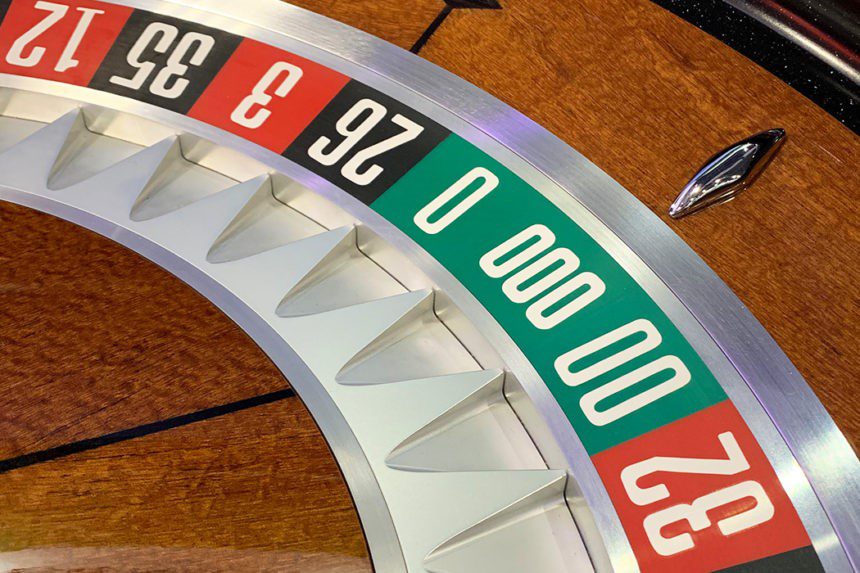There’s been some great news about gaming coming out of Las Vegas this year. Winning is the best publicity our industry can receive, especially if it is about big winners.
An Ultimate Texas Hold’em player at the Venetian hit the biggest progressive jackpot ever recently with a $2,699,320 haul, and that followed another hit there of $435,580 last month. At the beginning of June, Wheel of Fortune paid off a $2,198,173 jackpot at the Aria. A bit further south on the Strip, a bodybuilder from the United Kingdom nailed a $345,742 “Mega Progressive” on the Crazy 4 Poker table game at Planet Hollywood. More good things were happening on the felt with a $172,270 win on Pai Gow Poker at Sunset Station and a $239,054 strike on a Three-Card Poker Mega Jackpot at the Linq on Mother’s Day.
The year started with a $1,040,252 Dragon Link slot jackpot at Caesars Palace. And everyone seemed to be winning big on video poker, with multiple six-figure wins including a $240,000 hit at the end of May and another $100k Aces-With-A-Kicker at Caesars Palace on June 1st.
Even the sports news was all good for Sin City. Formula One is coming in November with a nighttime race down the boulevard. The Athletics may soon be playing in the future Tropicana ballpark. And, amazingly, who would have predicted that a city in the southern Nevada desert would become Hockey Town USA? Congratulations to the Golden Knights on winning Lord Stanley’s cup in a 4 to 1 blowout. (Note: Even better, no one was killed or injured in the post-event celebrations!).

But the Wall Street Journal put the town in the penalty box and threw a wet blanket on all the good news with this headline in their May 30th print edition:
“Why You’re Losing More to Casinos on the Las Vegas Strip”
The subhead went on to explain: “Gambling companies shift betting further in their favor, raising minimums at blackjack tables and tipping the odds in roulette.”
The story by reporter Katherine Sayre says, “Casinos on the Vegas Strip are making it costlier to play and harder to win. Payouts are lower for winning blackjack hands. Bets on some roulette wheels are riskier. And it is taking more cash to play at many game tables.”
In case you’re not a table games fan, the focus of this story was the proliferation of new blackjack games with a 6:5 payout and higher minimum bets. This means that if you wager $100 and get a blackjack (an Ace and a 10-value card), you are paid $120 (six $20s for your bet of five $20s). The traditional standard BJ game (at least since gaming started in Nevada in 1931) was a 3:2 payout, meaning you were paid $150 for that natural blackjack.
That $30 may not seem like a big deal since it adds only a 1.35% edge to the house. But a standard BJ game keeps somewhere from a half percent to 2% of each dollar bet depending on the player’s skill level. This 6/5 change almost doubles the house odds.

The other game mentioned in the Journal was roulette. The American standard was generally a wheel with two green zeros and 36 numbers divided between red and black. Your odds of hitting any single number were 1 in 38 with the double zero game (note: a few single zero games used to be found, but are rare today). The house edge on double zero was 5.26%. With the extra zero, the house edge goes to 7.69% or a 40+% increase.
According to a “Vegas Advantage” web survey quoted in the Journal, the “triple-zero roulette tables have grown from a handful in 2016 to 78 last year, compared with 111 double-zero tables.” And “more than two-thirds of blackjack tables on the Strip currently offer 6:5 payouts, as opposed to 3:2.”
To put it mildly, table game players are not happy. Huntington Press gaming publisher and the author of the respected “Las Vegas Advisor,” Anthony Curtis said, “They just gotta vacuum it out of them (their money) as fast as they can and say get the hell out of here yeah and wait for the next sucker.”
Long-time casino executive and table games consultant Bill Zender said, “If you go into a casino and gamble, and you lose your money fairly quickly, almost every time, you don’t feel you’re getting the bang for your buck.”
Why are they doing this? The simplest answer is because they can. The Journal story quotes Caesars Entertainment (CZR) chief executive Tom Reeg on a call with Wall Street analysts this month: “You’re bringing in higher value customers, and we’re already full. So, you’re kicking out the lowest end. I see no reason that that needs to stop or would stop.”
Curtis says he is asked almost daily about when this gouging will end. His response is pretty much in line with Caesars’: “My only answer is, it won’t stop until the casinos start to feel pushback. It’ll happen, but I don’t know when. As long as customers are willing to pay more for less, the casinos are only too happy to oblige.”
It’s hard to blame Reeg, Caesars, or their counterparts at MGM. Their primary mission is to produce the highest possible return for their stockholders. While it seems somehow wrong, it is hard to fault the logic of “whatever the market will bear.” That’s especially true when corporate investors are demanding higher and higher returns every quarter. But these short-term goals could have a big negative down the road.
Just before the pandemic, fear was spreading that the sky was falling because Millennials might not enjoy gambling. That was just silly. Anyone who has followed online poker, witnessed the explosion of fantasy football or even been to Las Vegas’ Circa Resort & Casino on an NFL weekend knows that young folks are gamblers. They actually love gambling. Maybe even more than Boomers ever did.
Yet, one thing the younger generation definitely doesn’t have is excess spendable income. Most of them are facing record-high housing costs, soaring gas prices and fees that continue to climb for everything from airline seats to concert tickets. While you may question the quality of education today, young folks are not complete fools. They can recognize a bad bet just like anyone else. Especially when there is an option to play a much better game off the strip, cheaper, closer to home or, God forbid, online.
Former dealer Richard Munchkin, who for years co-hosted the “Gambling With An Edge” podcast says, “My son who’s now 29 and his friends come to town, and they don’t gamble. They go out to clubs. They go to eat, and they don’t even bother gambling (here).”
Curtis agrees: “People used to come and have a gambling bankroll, but now they get five guys together so they can buy one bottle of vodka.”
It may be that Las Vegas will forever remain the preferred location for fun, food and frolic, but will the city lose its title as the gambling capitol of the world? That would be a shame since gaming still makes all the other amenities better with its higher margins and great ROI.
The worst of the worst would be if this trend spreads much farther. Right now, we seem to be spared as neighboring California, and many other off-strip casinos, have not added these rules. Zender is hopeful that this trend may be confined to just the Strip, “when you’re dealing with tourist destination resorts you can do 6/5. So, I think what’s happening is that the Native American casinos are dealing with mostly locals, so if they put a few 6/5s on the floor they are going to get in trouble.”
Some good news that Curtis points out in his monthly Las Vegas Advisor: “There are still bargains to be had in his town.” He adds, “but you have to seek them out.” He cites many places that still have liberal table game rules and loose slots. He summarizes it, “There’s dollar hot dogs, and there’s dollar beers. These things exist, and they can be sought out and found. It is just that I think that these big corporations with the big places (Caesars and the MRI’s), they are not going to get this this crowd and maybe they don’t want them.”
Hopefully, everyone takes Curtis’ advice and shops around, but Munchkin adds, “I think that the casinos on the strip have this attitude that their customers are staying in the hotel and are kind of captive. They don’t want to walk down the strip in 110-degree heat to go try to find a better game, so you know they’ll play anyway even no matter how bad it is.”
Hopefully, these policies don’t sour an entire generation on gambling in Las Vegas.
# # #
Here are some related links:
Anthony Curtis https://www.lasvegasadvisor.com/
Bill Zender https://billzender.com/
Richard Munchkin http://www.richardmunchkin.com/
Katherine Sayre https://www.wsj.com/news/author/katherine-sayre




